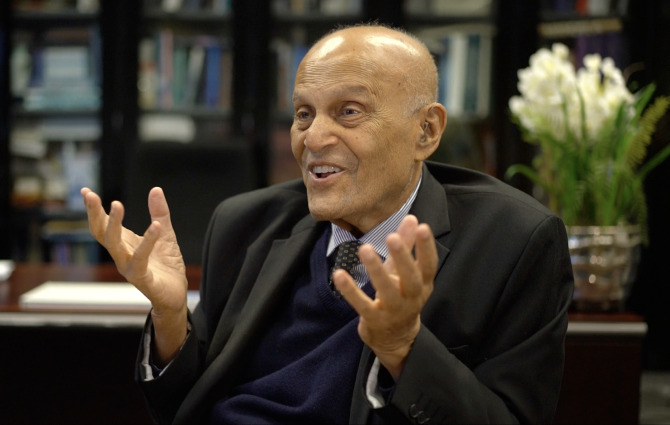
The story behind a world famous medical milestone has been revealed in a new interview by Professor Sir Magdi Yacoub, on the 40th anniversary of the operation that made his name.
In a new podcast, the pioneer of heart and lung surgery has told of his struggle to conduct lifesaving transplants and establish a new unit at Harefield Hospital.
The podcast, available on Acast and Spotify, was published today, 6 December 2023, exactly 40 years after Sir Magdi carried out Europe’s first ever combined heart and lungs transplant at the hospital, having never previously conducted such an operation.
In the interview, Sir Magdi said transplant work at the time was portrayed as a “dreadful, unethical operation which is experimental and the patients are not going to survive for more than a year or two and it was just for experimentation.”
He was accused of carrying out over-ambitious operations in order to make himself famous.
Political leaders in the late 1970s and early 1980s also believed Harefield was a “village hospital” unsuited to such major operations and declared that transplants were not a “viable” operation deserving of public money.
At one stage, Harefield village itself started raising money for patients at its hospital. Government inspectors were also sent to assess the hospital but declared the unit one of the best they had seen.
Speaking of the operation which effectively answered his critics in 1983, Sir Magdi said he had never seen the procedure before but had been reading about the innovative work being done in the US. He astounded his colleagues and the wider medical community when he went on to perform it successfully.
He said he had “studied it intensely and defined all the steps of the operation”, so that when it came to the complex procedure, he was able to go through it “very quickly, seamlessly, as if I had done thousands of these operations.”
His patient, a young Swede called Lars Llunjberg, survived for 13 days before pre-existing conditions – rather than problems caused by the transplant – ended his life.
But the ground-breaking operation on Lars – the first in Europe – meant that attitudes towards heart and lung transplants “completely turned around.” The procedure, Sir Magdi said, “opened many avenues around the world for the benefit of patients.”
Transplant recipients started to survive much longer than they had previously – in some cases, breaking records and adding decades to their lives.
“If you ask many patients do you want to live longer or do you want to have a good quality of life, you can’t have both, they will always go for the quality of life. As it happens, transplantation gives you both – gives you a longer life and a better quality of life,” Sir Magdi said.
Now 88, the pioneering surgeon was interviewed in the first of a new series of podcasts for Royal Brompton and Harefield hospitals, part of Guy’s and St Thomas’ NHS Foundation Trust. Sir Magdi said he was honoured to be the first interviewee, and stressed his reputation and success at Harefield was a team effort.
“We were looking for them and they were looking for us…I cannot claim credit for that,” he said. “I didn’t create it myself – we just found each other and there was a meeting of minds.”
He said he often felt he didn’t deserve all the accolades that people gave him, adding that what gave him most pleasure was hearing young students say they went into medicine because of the advances he had been able to make.
Hosted by double lung transplant recipient and digital storyteller, Oli Lewington, the new podcast series will delve into untold stories from Royal Brompton and Harefield hospitals, bringing to life their communities, exploring their world-leading innovations, and showcasing the people that make it so special, from staff and patients to volunteers and visitors. It is hosted on Acast and Spotify.
Contact information
Media enquiries
Phone: 020 7188 5577
Email: press@gstt.nhs.uk
